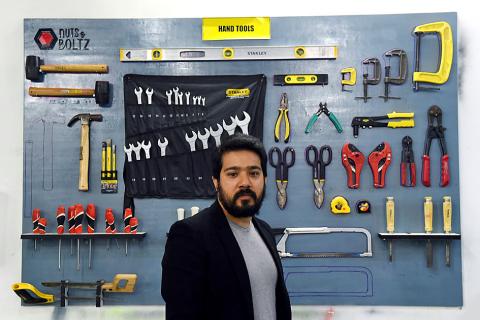When Saurabh Ahuja tried to import a US$600 3D printer for manufacturing drones in his New Delhi workshop, he ended up spending another US$900 in taxes and bribes and waited three months for it to clear customs.
“We lack in technology and industry to make the smallest things, so we have to import,” Ahuja said as he listed the frustrations entrepreneurs still encounter since the government launched its “Make In India” project.
“If my business grows, the country grows with me, but the government won’t let me grow,” he said.

Photo: AFP
Since coming to power in 2014, Indian Prime Minister Narendra Modi has been looking to overhaul India’s image as an awkward country in which to do business and instead emulate China by becoming a global manufacturing hub.
In September that year, the right-wing premier unveiled Make in India as a flagship initiative which would have an “unprecedented overhaul of out-dated processes and policies” at its core.
The government has tried to woo investors by promising to simplify the tax regime and liberalize rules on foreign direct investment (FDI).
However, in the World Bank’s most recent chart ranking countries for their ease of doing business, India came 130th out of 190.
While much of the focus has been on the travails of foreign firms, local entrepreneurs who should be the poster boys of Indian manufacturing are also struggling.
The printer that Ahuja did eventually manage to import from China to build everything from drones to robots had nearly 300 parts.
He first had to submit a sheaf of documents, including details of the exporter and the product catalog to officials at the Indira Gandhi International Airport. He was then told each part would have to be tested before being let through.
Three months and 150,000 rupees (US$2,337) in warehouse charges later, he got his consignment only after he coughed up a bribe, he said.
Officials at the airport did not respond to an e-mailed request for comment.
Ahuja, 29, launched his company Nuts and Boltz six years ago from a basement in northwest New Delhi to provide other budding entrepreneurs a place to experiment with product ideas.
For an hourly rental fee, clients have access to equipment such as 3D printers and circuit boards.
However, while the prototypes can be crafted in India, nearly all the manufacturing ends up being outsourced overseas.
“Maker spaces are great because you can quickly launch a prototype and get credibility,” said Navi Radjou, co-author of the book Frugal Innovation. “But then you open a Pandora’s box because if a customer asks for 2,000 units of your product, you’re screwed since you can’t make it at that scale and that leads to a lot of frustration.”
Ahuja was reminded of how onerous it was to manufacture at scale when the government last year banned the imports of lithium polymer batteries, needed to power the drones.
He now buys the batteries from Mumbai from someone who smuggles them in and then charges US$300, double the actual cost.
“Since the parts are not easily available, we’ve put on hold our classes to teach people how to make drones,” Ahuja said.
His complaints find echoes among large-scale manufacturers such Bajaj Auto chief executive officer Rajiv Bajaj.
A long-established motorbike manufacturer, Bajaj wants to introduce a quadricycle, but has encountered multiple obstacles.
“If your innovation in the country depends on government approval or the judicial process, it will not be a case of Made in India, but ‘Mad in India,’” Bajaj said in a speech this year.

Intel Corp chief executive officer Lip-Bu Tan (陳立武) is expected to meet with Taiwanese suppliers next month in conjunction with the opening of the Computex Taipei trade show, supply chain sources said on Monday. The visit, the first for Tan to Taiwan since assuming his new post last month, would be aimed at enhancing Intel’s ties with suppliers in Taiwan as he attempts to help turn around the struggling US chipmaker, the sources said. Tan is to hold a banquet to celebrate Intel’s 40-year presence in Taiwan before Computex opens on May 20 and invite dozens of Taiwanese suppliers to exchange views

Application-specific integrated circuit designer Faraday Technology Corp (智原) yesterday said that although revenue this quarter would decline 30 percent from last quarter, it retained its full-year forecast of revenue growth of 100 percent. The company attributed the quarterly drop to a slowdown in customers’ production of chips using Faraday’s advanced packaging technology. The company is still confident about its revenue growth this year, given its strong “design-win” — or the projects it won to help customers design their chips, Faraday president Steve Wang (王國雍) told an online earnings conference. “The design-win this year is better than we expected. We believe we will win

Quanta Computer Inc (廣達) chairman Barry Lam (林百里) is expected to share his views about the artificial intelligence (AI) industry’s prospects during his speech at the company’s 37th anniversary ceremony, as AI servers have become a new growth engine for the equipment manufacturing service provider. Lam’s speech is much anticipated, as Quanta has risen as one of the world’s major AI server suppliers. The company reported a 30 percent year-on-year growth in consolidated revenue to NT$1.41 trillion (US$43.35 billion) last year, thanks to fast-growing demand for servers, especially those with AI capabilities. The company told investors in November last year that

Power supply and electronic components maker Delta Electronics Inc (台達電) yesterday said it plans to ship its new 1 megawatt charging systems for electric trucks and buses in the first half of next year at the earliest. The new charging piles, which deliver up to 1 megawatt of charging power, are designed for heavy-duty electric vehicles, and support a maximum current of 1,500 amperes and output of 1,250 volts, Delta said in a news release. “If everything goes smoothly, we could begin shipping those new charging systems as early as in the first half of next year,” a company official said. The new